Key takeaways:
- ESG (Environmental, Social, Governance) frameworks are vital for mining investors, influencing risk profiles and long-term viability.
- Integrating ESG strategies leads to operational efficiencies, improved community relationships, and enhanced financial performance.
- Effective ESG implementation requires collaboration with stakeholders, measurable goals, and adaptability to community needs.
- Transparent communication and accountability strengthen trust and can transform challenges into opportunities for growth.

Understanding ESG in Mining
ESG, which stands for Environmental, Social, and Governance, is becoming a crucial framework in the mining industry. I remember my first encounter with ESG principles during an investment seminar; the speaker emphasized how these factors can significantly influence a company’s risk profile and long-term viability. Given that mining can have profound environmental impacts, understanding ESG is vital for investors who want to make informed decisions.
When I reflect on the social aspect of ESG, I can’t help but think about local communities. How often do mining companies really engage with the people affected by their operations? In my experience, those companies that prioritize community relationships not only foster goodwill but also see improved operational efficiencies. For me, it’s clear that a strong social strategy can lead to sustainable investments that benefit everyone involved.
Governance in mining is equally critical; it encompasses how companies conduct their business ethically and transparently. I’ve seen the consequences of poor governance firsthand: a company I once considered investing in faced significant backlash due to lack of transparency in its operations, leading to severe stock drop. It taught me the importance of looking beyond just the numbers—strong governance practices can offer a protective layer against unforeseen risks.
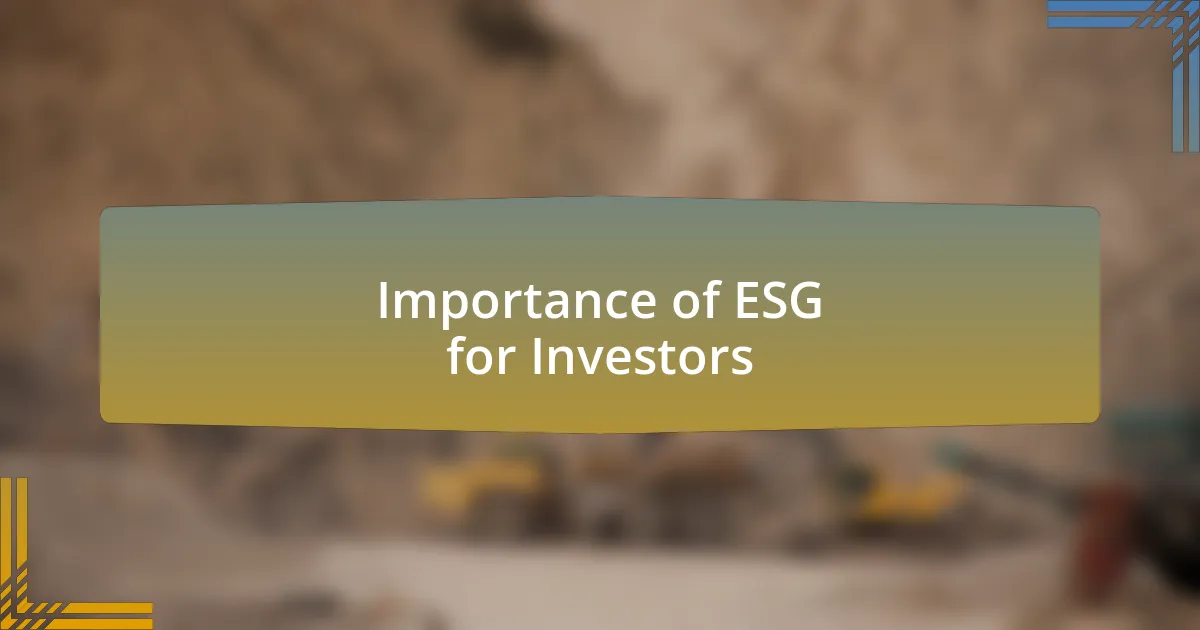
Importance of ESG for Investors
Investors increasingly recognize that ESG considerations are not just ethical guidelines but cornerstones of sound investment strategy. I recall a conversation with a fellow investor who dismissed ESG as “just another trend.” However, as we discussed his own investment portfolio, it became clear that companies with robust ESG policies consistently outperformed those without, especially in volatile market conditions. Isn’t it fascinating how aligning with sustainable practices can actually enhance financial performance?
The environmental aspect often directly influences investor sentiment. I once invested in a mining firm that faced criticism for its water management practices. It was alarming to observe how rapidly public perception shifted—a tarnished reputation can lead to decreased stock prices almost overnight. This experience taught me that ignoring environmental factors can expose investors to significant risks that extend far beyond the immediate financials. Shouldn’t we always consider how a company’s practices impact its long-term feasibility?
Moreover, social responsibility continues to shape investor decisions. I remember attending a meeting where a mining executive shared stories of how their employee safety initiatives had drastically reduced workplace accidents. I felt a wave of relief knowing that this focus not only protects workers but also ensures company stability and fosters positive community relationships. Isn’t this a crucial indicator of a company’s value in today’s investment landscape? In my view, neglecting these elements could mean overlooking very promising opportunities and inadvertently supporting practices that could cause harm.
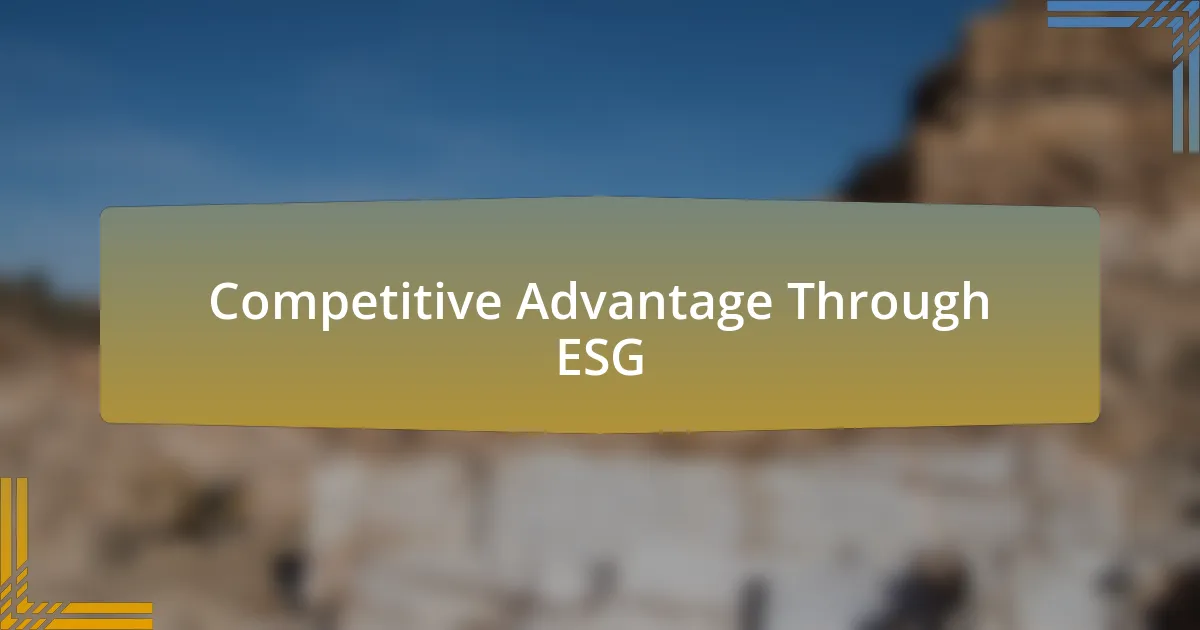
Competitive Advantage Through ESG
Competitive Advantage Through ESG
Integrating ESG strategies has given my investment decisions a clear edge. I recall investing in a mining company that prioritized sustainable resource management. Their commitment not only preserved the environment but also reassured stakeholders, resulting in increased investor confidence. Doesn’t it make sense that companies perceived as environmentally responsible attract more capital?
In my experience, a strong ESG framework can lead to operational efficiencies that enhance profitability. For instance, I worked with a firm that revamped its supply chain by minimizing waste and using renewable energy sources. The result? Lower operational costs and a stronger market position. How can other companies overlook such straightforward opportunities to boost their bottom line?
Moreover, I’ve witnessed firsthand how ESG leadership sets companies apart in competitive bidding situations. There was a time when a mining firm I was closely following won a crucial permit largely due to its exemplary community engagement and environmental stewardship. It was a clear reminder that demonstrating a commitment to local stakeholders not only improves reputation but also opens doors to new opportunities. Isn’t it time more companies recognized the value in being good corporate citizens?
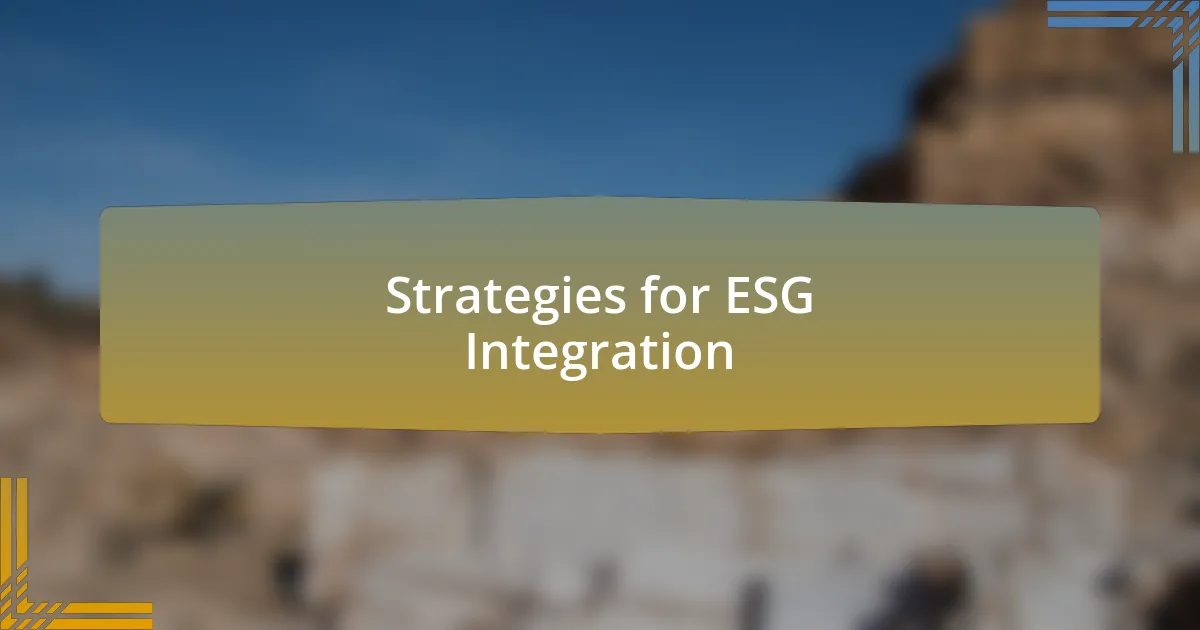
Strategies for ESG Integration
Integrating ESG into mining investments requires a thoughtful approach, and I’ve seen how embedding these principles into decision-making can transform a company’s trajectory. For instance, I once consulted for a mining operation that established rigorous environmental assessments before any project commenced. This proactive method not only mitigated risks but also fostered community trust, leading to smoother project approvals. Isn’t it remarkable how foresight can create such a ripple effect?
In my experience, collaboration with stakeholders is a game changer for effective ESG integration. I participated in a dialogue with local communities on a mining project, where their insights shaped our approach to resource extraction. This not only enhanced our social license to operate but also enriched the project itself with local knowledge. How often do companies truly embrace such inclusive practices that could vastly improve outcomes?
Additionally, establishing measurable ESG goals is crucial. I remember helping a mining firm set tangible sustainability targets that included reducing greenhouse gas emissions by 30% within five years. The accountability that came from these benchmarks not only motivated the team but also attracted investors who were eager to support a company with clear, impactful objectives. How can anyone deny the power of measurable success in driving investment?
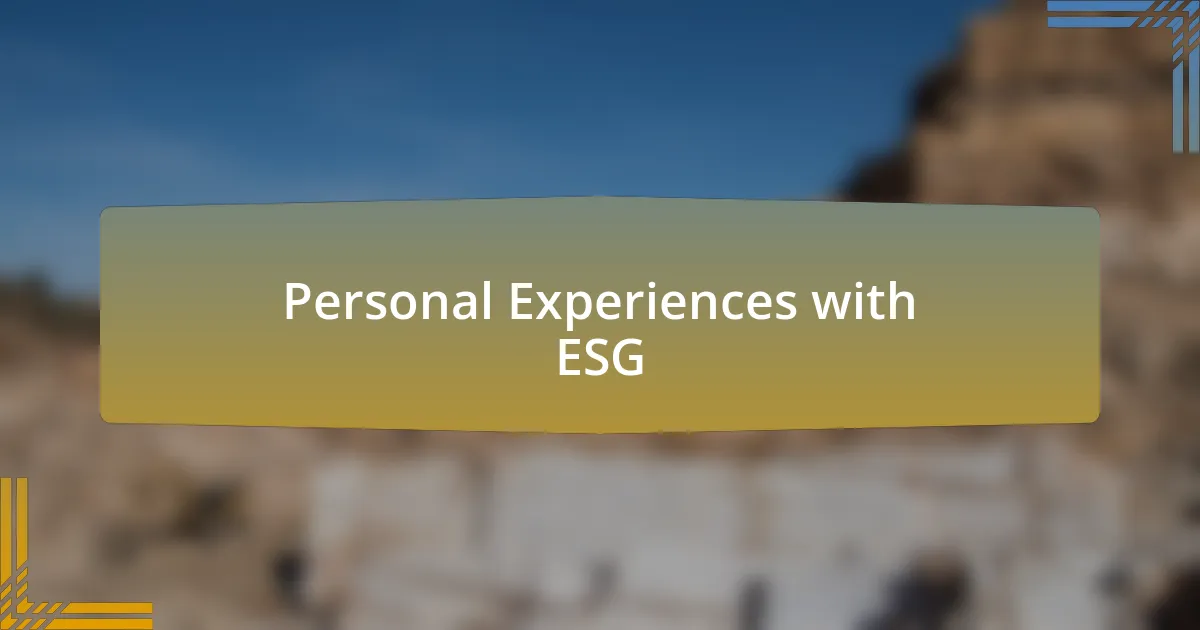
Personal Experiences with ESG
One of my memorable experiences with ESG was during a project aimed at rehabilitating mined land. I coordinated with environmental scientists and local NGOs to create a restoration plan that not only considered ecological factors but also valued the cultural significance of the land to indigenous communities. It was incredibly moving to see the positive reactions from the community when they understood they would be part of this recovery process. Isn’t it fascinating how integrating ESG can also respect and revitalize diverse cultural narratives?
I recall a time when I dealt with an unexpected environmental impact due to a mining process. Instead of sidestepping the issue, we took a bold approach by transparently communicating our findings to stakeholders and working collaboratively on solutions. This honesty not only reinforced our commitment to ESG principles but also deepened relationships with those affected. Have you experienced a situation where transparency turned a crisis into an opportunity for growth?
Another notable experience was leading a workshop on ESG best practices for mining professionals. The room buzzed with energy as participants shared their struggles and successes, turning what could have been a standard meeting into a powerful exchange of ideas and hope. It made me realize that when we genuinely invest in each other’s insights, we strengthen the entire industry. Isn’t it amazing how shared knowledge can ignite innovation?
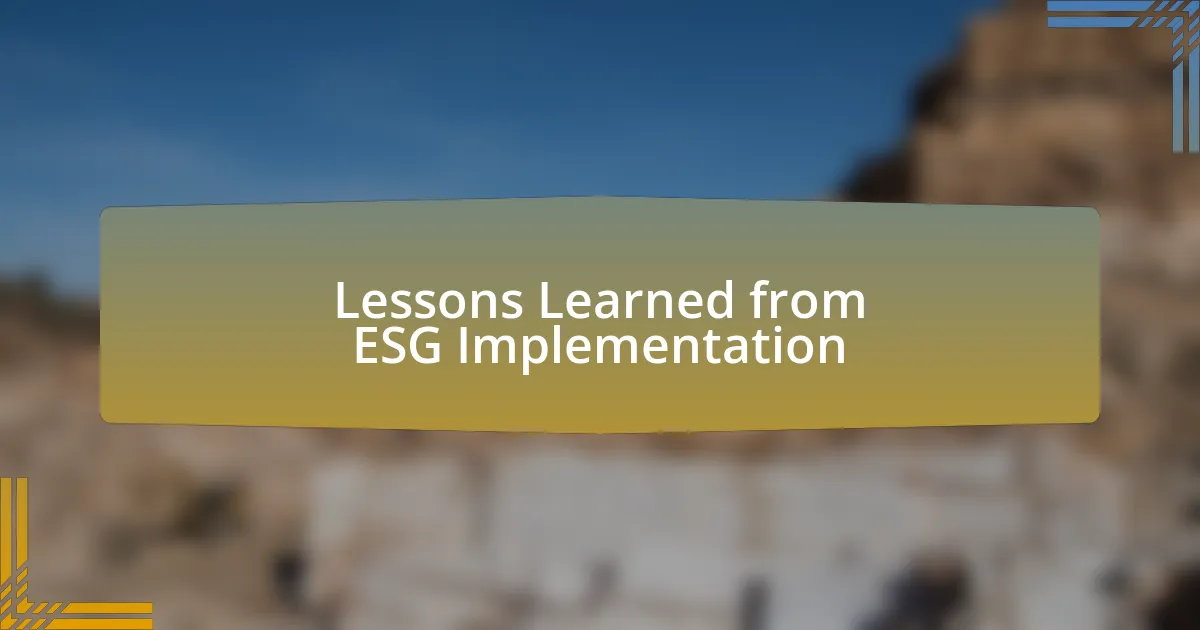
Lessons Learned from ESG Implementation
Implementing ESG strategies taught me that adaptability is crucial. During a project aimed at enhancing community engagement, we faced resistance from local stakeholders initially reluctant to embrace our proposals. However, by adjusting our strategies and actively involving them in the decision-making process, we transformed skepticism into partnership. Isn’t it empowering to see how flexibility can turn initial doubt into collective enthusiasm?
I also learned the importance of measuring and communicating outcomes clearly. After introducing an environmentally friendly procedure in our operations, I was fortunate to present the results at a regional mining conference. Sharing tangible data and personal stories about the positive impact on local ecosystems not only validated our efforts but also inspired other companies to consider similar initiatives. How often can you say your work has sparked change beyond your immediate team?
On a personal note, I discovered that fostering a culture of accountability is essential for sustained ESG success. In one particular project, I encouraged teammates to voice their perspectives on ethical dilemmas, which created a safe space for open dialogue. This collective accountability not only strengthened our decision-making but also cultivated a team spirit rooted in shared values. Have you ever experienced how trust can elevate team dynamics?